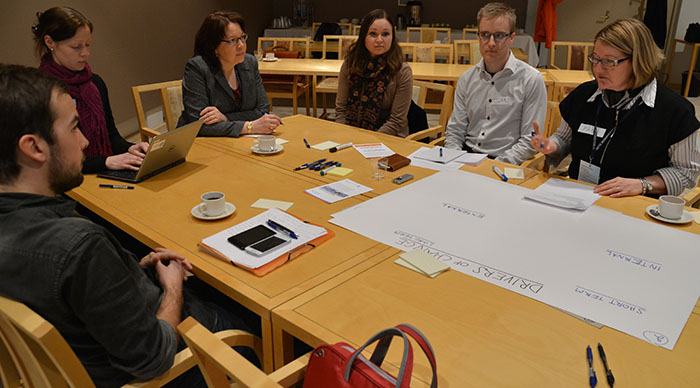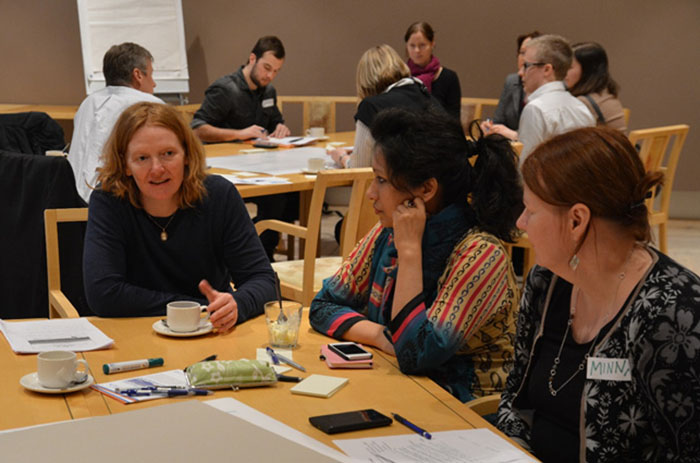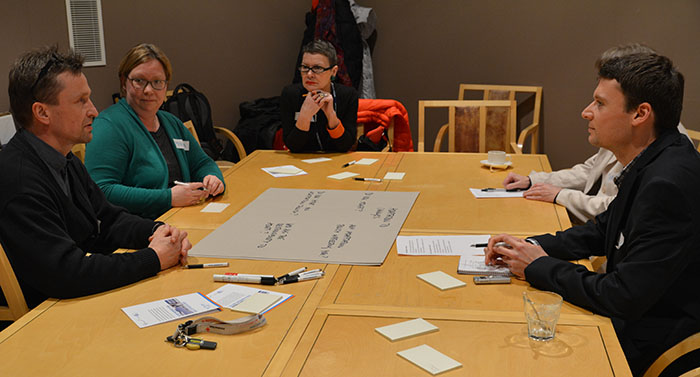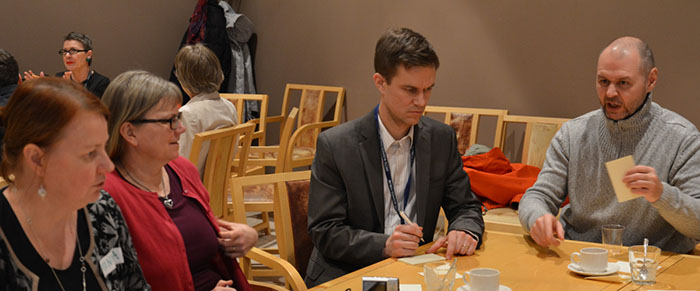On March 12th people from various fields of business and research gathered to Rovaniemi to discuss the topic of “change and adaption”. The workshop was a part of the Adaptation Actions for a Changing Arctic (AACA) project, under the auspices of the Arctic Council. The goal of the project is to develop a knowledge base for identifying socially, economically, environmentally and culturally appropriate adaptation options for the decision makers in the region. The event was arranged in cooperation with the Arctic Business Forum.

After the introducing presentations – which mostly concentrated on the usual narrative of unprecedented and dangerous global warming, but also gave an interesting insight to the tourism business – it was time for the participants to have their say. The discussion was built around three tables: drivers of change, impacts of change, and adaption to change. Various kinds of drivers were identified during the discussions: political, economic, social, cultural, environmental, and technological. One political driver of change in Finnish Lapland that stimulated much discussion was centralization. The situation when state resources and public investments are centralized to the most populated areas of the country was linked also to other drivers such as urbanization and aging of the population in Finnish Lapland. As possibilities and jobs move more to the southern Finland, people – especially the young – are moving away. In addition, also older people follow better services to the bigger cities.
Recently topical issue of geopolitical power relations was also said to have changed the business environment. EU’s sanctions against Russia were mentioned, but no represented businesses were directly affected. Though, the euro-ruble exchange rate has affected tourism in Lapland, as it is now more expensive for the Russians to visit the euro-countries.

The environmental drivers of change were most salient from the perspective of tourism, as it is anticipated that snow-season would shorten and cloudiness would increase if arctic climate gets warmer. This would reduce the attractiveness of Lapland as a resort. In addition, also positive changes were seen. Climate change creates opportunities for business, for example increasing use of new shipping routes, which, in turn, would demand more harbors, railways and roads. So it might allow some big projects. New opportunities were highlighted also by micro-companies, as climate change creates new kinds of needs. It was noted, that increasing business activity can also be seen as a negative issue. The economic development that big infrastructure projects would bring along will mean increased pressure on the environment. With increased activity also the risk for oil spills and other pollution issues would increase.
As mentioned, one central theme of the workshop was adaption. The need to adapt to the changes the climate change is expected to bring has been the main theme in many high-level policy and strategy publications in the EU and on the national levels in the arctic region. But it has got little attention outside these publications, as the mitigation of climate change dominates the discussion.

The talk about change and adaption is moving to areas where it is no longer merely in the context of climate change, but also in the context of socio-economic developments in general. This is the case also in the AACA project. This trend can be seen in the expanded definition for adaption in the EU’s latest adaption strategies. This pushes these concepts and lines of thought to wider areas of society where their rationalities are more debatable.
The participants found the concept of adaption a bit difficult to discuss since it is so general. More detailed concept was hoped. As one participant noted, adaption can be seen as the basis of existence for any company. To make profit, one has to adapt all the time, whether it be to the client’s needs, the economic situation, technological change or a change in national regulations.

When considering who has the responsibility to adapt, many views came up. From one perspective, no-one has a responsibility to adapt. Instead, many might have a necessary need to do that. And it may not be a conscious action. On the other hand, adaption was seen as everyone’s shared responsibility. Overall, adaption was seen as a positive goal to strive for, but some kind of knowledgeable guidance of society and individuals was hoped. But a question was also raised about how much would this kind of top-down guidance leave space for individual initiatives and people’s own experiences of change and different frameworks of adaption – or even space for resisting the change rather than adapting to it.
The results of the AACA-project will be presented to the Arctic Council ministerial meeting in 2017.
Text: Ilari Nikula
Photos: Ilkka Tiensuu